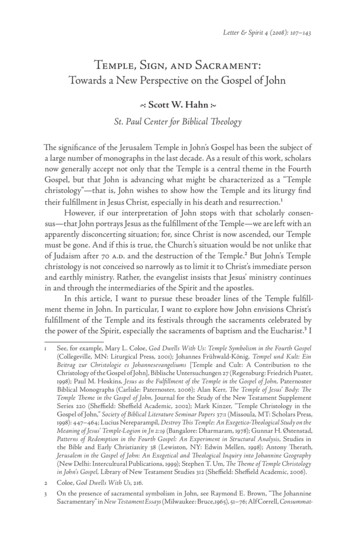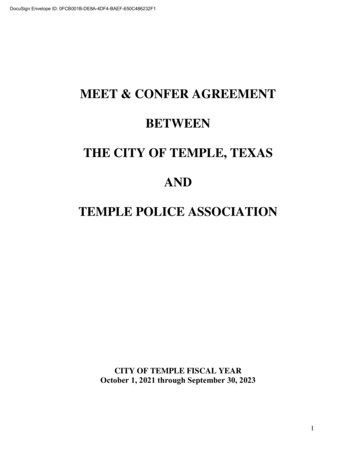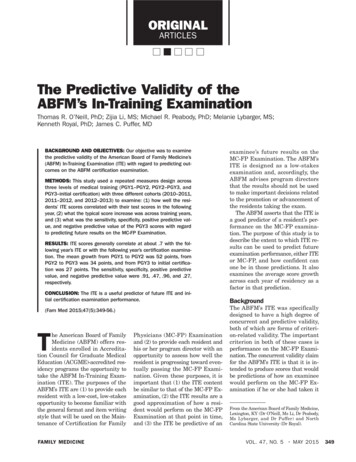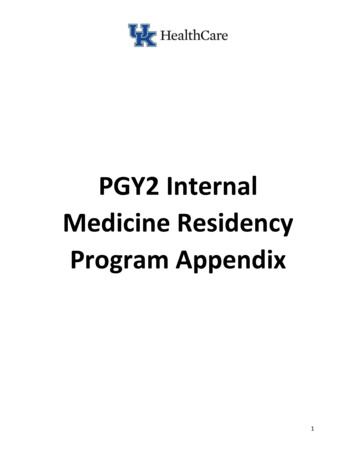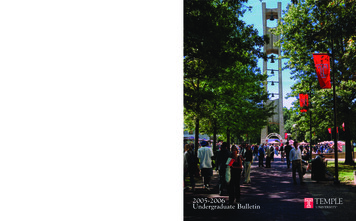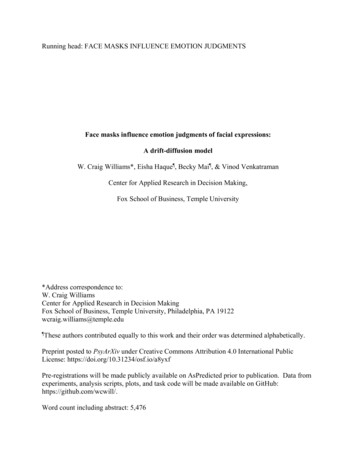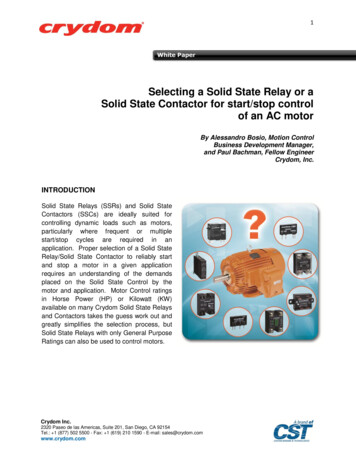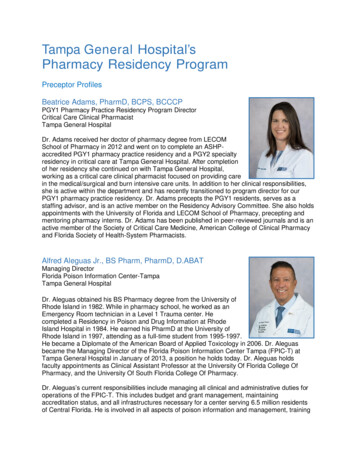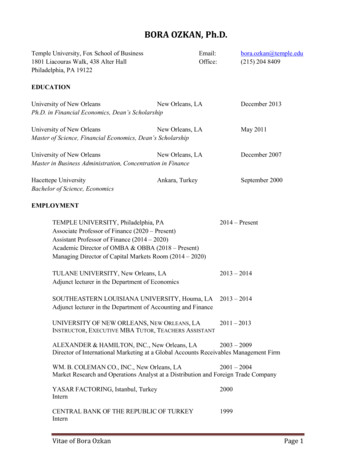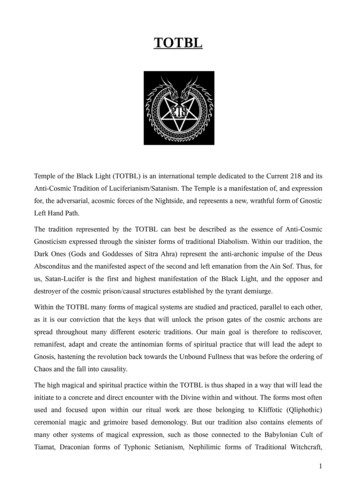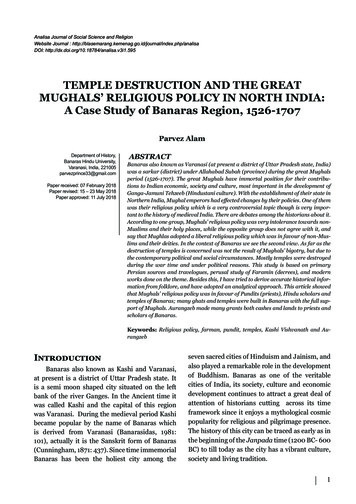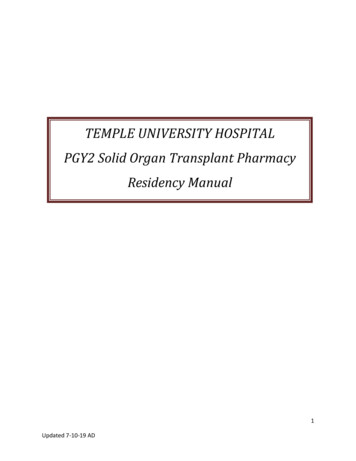
Transcription
TEMPLE UNIVERSITY HOSPITALPGY2 Solid Organ Transplant PharmacyResidency Manual1Updated 7-10-19 AD
Temple University Hospital PGY2 Solid Organ Transplant Pharmacy Residency ProgramResidents will have the opportunity to work in an academic tertiary care center in both theinpatient and ambulatory settings exposing them to a diverse constituency of patients, healthcareproviders, residents and students. The resident will have a primary site at Temple University Hospital(TUH) and will participate in clinical rotations focused in the area of solid organ transplant, perform alongitudinal residency research project and drug use evaluation, and staff in the pharmacy departmenton a decentralized clinical pharmacist shift that encompasses solid organ transplant patients. TempleUniversity Hospital provides a variety of excellent opportunities to grow as a solid organ transplantclinical pharmacist and provides access to a strong group of preceptors and an exciting environment tonurture teaching skills.Temple University Hospital- TUH is a member of the Temple University Health System (TUHS) which iscomposed of 5 hospitals. TUH is a 593 bed institution and is the primary hospital of TUHS located inPhiladelphia, Pennsylvania. It is also the chief clinical training site for the Temple University School ofMedicine, Nursing, Pharmacy, as well as, other healthcare professional disciplines. Temple UniversityHospital has been recognized as among the best in the region by US News & World Report.TUH performed the first heart transplant in the Philadelphia region back in 1984. Currently, it isthe leader in lung transplantation, with 131 lung transplant surgeries, the most in the United States in2017. In addition, TUH has a robust abdominal organ transplant program (kidney, liver, and pancreas)and heart transplant program, with 2017 averages of 80 and 25 surgeries, respectively. For 2018, TUHhas established a referral basis with area hospitals to expand our transplant programs.TUH’s first pharmacy residency program was founded in 1969, and its graduates have gone onto successful careers in ambulatory care, critical care, infectious diseases, solid organ transplant, andacademia, among others. There are currently 5 PGY1 pharmacy residents who gain clinical experience atboth the TUH and Jeanes Hospital campuses. The PGY2 Solid Organ Transplant pharmacy resident willhave opportunities to gain clinical experience at both these campuses as well. This program will furtherenhance their clinical skills and knowledge through participation on the multidisciplinary transplantteam. PGY2 pharmacy resident involvement will range from providing clinical services in the inpatientand outpatient settings, developing protocols and policies, educating pharmacy students and residents,and performing outcomes research.Mission of Department of Pharmacy (TUH-PHARM 20209.02.02 Department of Pharmacy: Scope,Organization, and Function)The mission of the Department of Pharmacy Services is to provide safe, comprehensive, high quality,patient specific, pharmaceutical care in an environment of professionalism, respect, and integrity.1. The prime mission of the Department of Pharmacy is to support the mission and programs ofTemple University Hospital by providing high quality, cost-effective pharmaceutical services.2. The department enhances the educational mission of the university by serving as a training sitefor its students and develops other programs in institutional practice.3. The department adds to the knowledge of the pharmaceutical and medical professions byproviding new information and a better understanding of existing information.4. The department adheres to sound business practices in order to assure the continuedmaintenance of these services.2Updated 7-10-19 AD
Goals: In support of the mission, principles and core values of Hospital and Health System, theDepartment of Pharmacy has established the following goals:1.2.3.4.5.6.7.8.9.To provide safe and controlled drug distributionTo provide, monitor, and assure safe and cost-effective drug therapyTo promote professionalism, diversity and systematic service deliveryTo assure satisfied, competent and qualified personnelTo assure that products and services are of proper qualityTo maintain a close liaison with Temple University, School of PharmacyTo conduct education and training programsTo conduct and facilitate research on drugs and drug related servicesTo assure recognition of the department including its membersPGY2 Solid Organ Transplant Residency Program Statement of PurposePGY2 Solid Organ Transplant pharmacy residency programs build on Doctor of Pharmacy (Pharm.D.) educationand PGY1 pharmacy residency programs to contribute to the development of clinical pharmacists in specializedareas of practice. PGY2 Solid Organ Transplant residencies provide residents with opportunities to functionindependently as practitioners by conceptualizing and integrating accumulated experience and knowledge andincorporating both into the provision of patient care or other advanced practice settings. Residents whosuccessfully complete an accredited PGY2 Solid Organ Transplant pharmacy residency are prepared foradvanced patient care, academic, or other specialized positions, along with board certification, if available.PROGRAM OUTCOMESCompletion of the PGY2 Solid Organ Transplant Pharmacy Residency program will provide a foundationto pursue multiple career paths including but not limited to:1. Providing pharmaceutical care to all populations of solid organ transplant recipients2. Providing clinical, practice management and professional leadership3. Pursing additional post-graduate training (Solid Organ Transplant Pharmacy Fellowship)PROGRAM DESIGNThe residency is a 52-week post-graduate program that begins on July 1 each calendar year consisting ofrequired, elective and longitudinal learning experiences. The goals and objectives of each rotation aredesigned to meet or exceed ASHP residency learning system (RLS) standards while allowing enoughflexibility to develop the specific learning interests of each resident. The resident must complete therequired learning experiences and will have the opportunity to select two elective learning experiences.In order for the resident to begin a scheduled learning experience with a non-pharmacist preceptor inconjunction with a pharmacist preceptor, the resident must demonstrate independence and clinicalcompetence. This will be determined through evaluation of required goals and objectives for theresidency program. The resident must receive an “achieved for residency” for the following requiredobjectives prior to starting a scheduled learning experience with a non-pharmacist preceptor inconjunction with a pharmacist preceptor. The resident may not start a learning experience with a nonpharmacist preceptor in conjunction with a pharmacist preceptor if “needs improvement” is received forany of the R1.1 objectives. Current available learning experiences that include a non-pharmacistpreceptor are transplant infectious diseases and transplant hepatology.3Updated 7-10-19 AD
1) Objective R1.1.1: (Applying) Interact effectively with health care teams to manage solid organtransplant patients’ medication therapy.2) Objective R1.1.2: (Applying) Interact effectively with solid organ transplant patients, familymembers, and caregivers.3) Objective R1.1.3: (Analyzing) Collect information on which to base safe and effectivemedication therapy for solid organ transplant patients.4) Objective R1.1.4: (Analyzing) Analyze and assess information on which to base safe andeffective medication therapy for solid organ transplant patients.5) Objective R1.1.6: (Applying) Ensure implementation of therapeutic regimens and monitoringplans (care plans) for solid organ transplant patients by taking appropriate follow-up actions.6) Objective R1.1.8: (Applying) Demonstrate responsibility to solid organ transplant patients forpatient outcomes.The PGY2 Solid Organ Transplant Pharmacy Residency Program is structured as follows:1. Required Rotations (8 total)2. Elective Rotations (2 total)3. Longitudinal Learning Experiences – ongoing training throughout residency year (4 total)a. Abdominal Organ Transplant Clinic- 5 monthsb. Cardiothoracic Transplant Clinic- 6 monthsc. Research Project- 12 monthsd. Drug Use Evaluation- 12 monthse. Code Blue, Rapid Response, Stroke Alert- 12 monthsf. Staffing- 12 monthsRequired RotationsHospital and Departmental OrientationAbdominal Organ TransplantLung TransplantCardiovascular Surgical Intensive Care/Heart Transplant/Mechanical CirculatorySupportTransplant Infectious DiseasesHistocompatibility and ImmunogeneticsElective RotationsSurgical Intensive CareTransplant HepatologyOutpatient Transplant Clinic (AOT/Nephrology)Bone Marrow Transplant (at Jeanes Hospital)PreceptorAdam Diamond, PharmD, BCPSAdam Diamond, PharmD, BCPSJenny Au, PharmDChristina Ruggia-Check, PharmD, BCPS, AQCardiologyDuration4 weeks10 weeks10 weeks10 weeksKazumi Morita, PharmD, BCPSHeather Clauss, MDAdam Diamond, PharmD, BCPSOlga Timofeeva, PhD, D(ABHI)4 weeksPreceptorKimberley Harris, PharmD, BCPS, BCCCPAdam Diamond, PharmD, BCPSAdam Diamond, PharmD, BCPSBrittany Cael, PharmD, BCPSDuration4 weeks4 weeks4 weeks4 weeks1 week4Updated 7-10-19 AD
Longitudinal ExperiencesAmbulatory transplant clinic: Pre-transplant evaluations Post-transplant clinico Abdominal organ transplant clinico Cardiothoracic clinicTeaching Opportunities: Co-precept PGY1 residents and APPE students Clinical enhancers and in-services to medical,nursing, and pharmacy staff Patient case, journal club, and researchpresentationsAdministrative Opportunities: Multidisciplinary selection meetings Quality improvement committee meetings Professional development series Preceptor development seriesPharmacy Practice: Clinical staffing shift once every 3rd weekend One summer and one winter holiday staffing shift Code blue/rapid response/stroke team attendanceProject/Research ExperiencesLongitudinal Residency Research Project: Solid organ transplant focus Outcomes-based research Submit for national presentation and /orpublicationDrug Use Evaluation: Solid organ transplant focus Present results to pharmacy and therapeuticscommittee Present results to pertinent transplant teamsTravel Opportunities: Travel to ASHP Annual Midyear Meeting Travel to American Transplant Congress Opportunity for poster and/or oral abstractpresentationAdditional opportunities: Guideline/protocol development Department of Medicine research curriculumProgram Requirements- (TUH-PHARM 20209.14.18 PGY2 Pharmacy Residency Program- Responsibilitiesand Expectations). Residents will be required to perform or participate in a number of activitiesthroughout the year. These activities are designed to assure competency with the goals and objectivesoutlined in the ASHP PGY2 residency accreditation standards. In addition to the expectations of thelearning outcomes, we expect residents to be able to: (i) describe their personal philosophy ofpharmaceutical care that is based on a thorough understanding of emerging health care deliverysystems and the role of pharmacy in helping patients and other health professionals to achieve optimalpatient outcomes, (ii) function as clinical pharmacists, and (iii) participate in medication use review anddrug policy development. Residents must be able to communicate effectively verbally and in writingwith other team members. Residents must be able to teach others effectively about drug therapy andparticipate in quality improvement initiatives.REQUIREMENTS TO ENTER THE RESIDENCY PROGRAM:Applicant Selection Procedure- (TUH-PHARM 20209.14.21 PGY2 Pharmacy Residency ProgramResident’s Selection Policy). We utilize a screening tool to assess each residency application for the PGY2Solid Organ Transplant Pharmacy Residency Program. Upon applicant screening, an assessment scorewill be applied to their application. The residency advisory committee will select a minimum of 4candidates to interview based upon the initial screening scores. The same preceptor group willparticipate in the interview to allow for consistency in assessment of all residency candidates. Ourinterview process consists of 2-3 groups of interviewers. The interview questions will includeadministrative and clinical components. The applicant will also be required to present a 20 minutepresentation on a topic related to solid organ transplant. A Residency Selection Meeting, composed ofinterviewers and the RPD, will do the final ranking based upon the applicant’s performance. The rankingorder list, in the order of preference, is submitted to the National Matching Service (NMS) for use in the5Updated 7-10-19 AD
ASHP Resident Matching Program. We believe that our residency selection process is fair and allows usto identify the strongest candidates.Licensure Requirement- (TUH-PHARM 20209.14.18 PGY2 Pharmacy Residency Program- Responsibilitiesand Expectations). Residents must be able to obtain pharmacist licensure with the State Board ofPharmacy of Pennsylvania by September 30th of the residency year (www.dos.state.pa.us/pharm). If theresident is not licensed in the State of Pennsylvania by September 30th, they will be terminated from theresidency program.Completion of an ASHP accredited PGY1 Pharmacy Residency program- (TUH-PHARM 20209.14.18PGY2 Pharmacy Residency Program- Responsibilities and Expectations). The resident must provide theresidency program director with a copy of their PGY1 residency certificate as proof of completion of anASHP-accredited PGY1 Pharmacy Residency program by the second Friday of the PGY2 SOT pharmacyresidency program. In addition, the office of Graduate Medical Education will also verify the enrollmentof the matched resident in an ASHP-accredited PGY1 pharmacy residency program during the hiringprocess.RESIDENCY ORIENTATION:Residency Orientation Program- (TUH-PHARM 20209.14.03 Orientation Program for PharmacyEmployees). Orientation for the resident is scheduled for the July of each year. This orientation period isused to introduce the incoming resident to Temple University Hospital, the Department of Pharmacyand to outline the expectations for the residency year.RESIDENCY EXPECTATIONS FOR RESIDENTS AND PRECEPTORS:Duty Hours- (TUH-PHARM 20209.14.15 PGY2 Pharmacy Residency Program- Resident Supervision andDuty Hours). Successful completion of a rotation is dependent on the active participation of the residentin the care of their patients. The resident should be physically present on the patient care unit daily,Monday through Friday of each week of the rotation, to complete rounding, clinical monitoring, codeblue response, admissions/discharge counseling, clinical topic discussions and patient review with thepreceptor. Hours vary depending on the rotation. (see individual learning experiences for details).Required Clinical Rotation Activities (TUH-PHARM 20209.07.05- Documentation of Clinical Services)1. The resident will complete the following activities for their patients unless otherwise specified inthe rotation learning experience descriptioni. Attend patient care roundsii. Complete daily profile review of the following patient information assigned bysite preceptor: Vital signs, medication profile, medication administration record,progress notes, etc. Age, sex, height, weight, and renal/hepatic function Pregnancy and lactation status Appropriateness of the dose, route, rate, timing, and frequency ofadministration, indication, and therapeutic duplication of allmedications (TUH-PHARM 20209.07.03 Safety Plan for Patients andPersonnel) Available laboratory values and microbiology results6Updated 7-10-19 AD
iii.iv.v.vi.Appropriateness of antimicrobial therapy regimens which may includeanticipated/planned stopped dates Potential drug-drug, disease-drug, food-drug interactions,contraindications or drug storages and outages (TUH-PHARM20209.06.09 Medication Storages and Outages) Targeted or therapeutic drug monitoring and pharmacokinetics, andadjustment of drug regimens if necessary (TUH-PHARM 20209.07.18Medication Order Review by a Registered Pharmacist) Review for disease progression and resolution of symptoms Look-alike /sound-alike medication management (TUH-PHARM20209.08.12 Look-Alike/Sound-Alike Medication Management)Communication of necessary information to pertinent health care providers,patients, and caregiversMedication reconciliation (admissions, discharges)Discharge education (TUH-PHARM 20209.08.06 Medication for DischargedPatients)Research and answer drug information questionsPreceptor Responsibilities (TUH-PHARM 20209.14.20 PGY2 Pharmacy Residency Program- Preceptor’sSelection Policy)Preceptors must meet eligibility criteria as listed in the ASHP PGY2 standard. Preceptors are assessed forcompetency and on-going job skill development periodically.(TUH-PHARM 20209.14.02- Pharmacycompetencies and Performance Evaluation)i. Review the resident’s understanding of subjective/objective, assessment, andplan for each of their patients (medical and pharmacy perspectives)ii. Provide feedback to the resident in which they can act on to improve theirperformanceiii. Serve as a resource to help the resident care for their patientsiv. Challenge the resident to support care decisions/recommendations withevidence based medicinev. Provide clinical topic discussions, pearls, articles, and resources to help theresident fill gaps in knowledgeThe following procedure will be followed when appointing new preceptors to the PGY2 SOT PharmacyResidency Program:1) RPD will recommend a clinical specialist or clinical pharmacist to become a residency preceptorupon reviewing their qualifications, performance, and completed Academic and ProfessionalRecord Form.2) RAC will review, approve and offer the preceptor position to the qualified clinical specialist orclinical pharmacist.3) The preceptor must be in good standing according to the Pharmacy Competencies andPerformance Evaluation Policy (TUH-PHARM 20209.14.02).The following procedure will be followed when reappointing preceptors to the PGY2 SOT PharmacyResidency Program:7Updated 7-10-19 AD
1) All current preceptors must provide an updated academic and professional record form by thefirst Friday in June of the residency year to the RPD for evaluation and review.2) RPD will recommend a clinical specialist or clinical pharmacist to continue as a residencypreceptor upon reviewing their qualifications, performance and updated Academic andProfessional Record Form.3) RAC will review, approve, and notify the qualified clinical specialist or clinical pharmacist thatthey are reappointed as a preceptor.4) The preceptor must be in good standing according to the Pharmacy Competencies andPerformance Evaluation Policy (TUH-PHARM 20209.14.02).5) If a preceptor is not reappointed after review by the RPD and RAC, the RPD will notify thepreceptor and explain why the decision was made. The RPD will also explain to the preceptorthe necessary requirements for the preceptor to be reappointed in the future, if applicable.Residents will work under the direct supervision of preceptors for all activities. The preceptor will alsobe available on a regular basis to provide modeling and coaching by direct supervision ofdispensing/clinical activities, discussion of any issues, facilitate interactions with other healthcare teammembers, provide guidance in preparation of any materials required, and evaluate residentperformance.Resident Responsibilities:By the end of the residency program, the resident is expected to complete the following activities andabide by the following policies and procedures:1) Hospital Orientation Activities:1. New Employee Orientation2. Advanced Cardiac Life Support (ACLS) and Basic Life Support (BLS) training andcertification3. Hospital Tour4. Computer Training (HMM, TDS)5. Epic, Pyxis Talyst Training6. Investigational Drug Services7. Sterile and Non-Sterile Product Compounding (TUH-PHARM 20209.09.06 General IVProduction and Clean Room Procedures)8. Clinical Pharmacist Training on each floor9. Regulatory Compliance and controlled substance10. PharmAcademic Evaluations11. Clinical Interventions (Clinical Measures), Form checker and InfoShare drivedocumentation12. Hospital and Pharmacy Policies and Procedures Review13. Computer Usage, encrypted messages (HIPPA), codes/RRT14. Clinical Programs IV to PO, therapeutic interchange, stress ulcer prophylaxis, andrenal dosing adjustment15. Staffing and clinical weekends monitoring8Updated 7-10-19 AD
2) Active Participation in the Successful Completion of a Drug Use Evaluation (DUE)The resident is required to participate in a Drug Use Evaluation (DUE). The purpose of the DUElearning experience is to identify an area in which drug utilization should be evaluated to changeand/or validate current practices. Performance is evaluated by the DUE preceptor inPharmacademic.3) Participation in Teaching ActivitiesResident involvement in teaching activities fosters development and refinement of theresident’s communication skills, builds confidence and promotes the effectiveness of theresident as a teacher. The resident will participate in activities including in-services; coprecepting of students/PGY1 pharmacy residents and providing a didactic lecture in thetransplant pharmacotherapeutics course sequence at the Temple University School of Pharmacy(didactic lecture is optional).4) PresentationsResidents will be required to present a poster at the ASHP Midyear and submit an abstract for apotential poster/platform presentation at the American Transplant Congress on the resident’sresearch project. In addition, residents will be asked to give at least one case presentation andone journal club to pharmacy staff, residents and students. In-services will occur throughout theyear, depending on the particular learning experience. Some of the specific timelines are asfollows:1.2.ASHP Midyear Clinical Meeting Poster Presentation (held in December)a. Consult www.ashp.org for submission/registration deadlinesAmerican Transplant Congress (held between April - June)a. Abstract will be submitted for potential poster/platform presentationb. If platform presentation accepted, at least 3 weeks before the conferencethe resident will participate in a practice session to all preceptors. Clinicalpharmacy specialists and all residents are expected to attend and providefeedback.c. All residents are expected to attend co-residents’ presentations.d. Consult 018-american-transplantcongress#.W2nBuNJKjcs for submission/registration deadlines.5) Participation in Recruitment EffortsThe resident will assist with the recruitment efforts of the department for the PGY1 and PGY2Solid Organ Transplant Pharmacy Residency Programs. There will be some scheduled timewithin the interview process for interviewees to interact with the current resident. Additionally,each resident is requested to spend time providing information to interested candidates duringthe ASHP Midyear Clinical Meeting. Residents will be asked to staff the residency showcase.6) Completion of BLS and ACLS CurriculumEach resident is expected to successfully complete the BLS and ACLS curriculum within the firstmonth of the residency. The goal is to ensure the resident is familiar with and capable ofproviding appropriate BLS and ACLS services, in the event of a code/rapid response.7) Professional ConductIt is the responsibility of the resident to uphold the highest degree of professional conduct at all9Updated 7-10-19 AD
times. The resident will display an attitude of professionalism in all aspects of his/her dailypractice. The resident shall also comply with all TUH policies related to conduct in theworkplace.8) Personal AppearanceThe resident is expected to dress in an appropriate professional manner whenever they are inthe institution or attending any function as a representative of TUH. Clean, pressed white labcoats of full length will be worn at all times in patient care areas.9) Employee BadgesTUH requires all personnel (including residents) to wear a badge at all times when they are oncampus. If the badge is misplaced, a replacement badge is available in the Human ResourceDepartment (HR), for a minimal fee. If an employee badge is lost the resident must report theloss immediately to HR. All badges will be relinquished at the completion of the residencyprogram.10) Patient ConfidentialityPatient confidentiality will be strictly maintained by all residents. Any consultations concerningpatients will be held in privacy with the utmost concern for the patients’ and families’ emotionaland physical well-being.11) Outside Employment (Moonlighting) (TUH-PHARM 20209.14.16- PGY2 Pharmacy ResidencyProgram Moonlighting Policy). The resident is not permitted to moonlight until December 1st ofthe residency year. The residency program director must approve all additional shifts (bothwithin and outside of TUH).12) Attendance (TUH-PHARM 20209.14.17- PGY2 Pharmacy Residency Program Time Off Policy)The resident is expected to attend all functions as required by the Department of Pharmacy. Theresidents are solely responsible for their assigned operational pharmacy practice, and areresponsible for assuring that these service commitments are met in the event of an absence. Alltime off requests must be approved in advanced with the involved preceptor, PharmacyManager of Clinical Services and Education and Residency Program Director to assure thatservice responsibilities can be fulfilled. The resident must complete the Resident Absence Form.A copy of the completed absence form must be sent to the Residency Program Director forrecord keeping. Residents are expected to work a full 8-hour shift per day at a minimum.Residents are required to keep track of their hours. The resident will email the duty hoursdocumentation to the Residency Program Director at the end of each rotation.13) Leave of Absence (TUH-PHARM 20209.14.19 PGY2 Pharmacy Residency Program Leaves ofAbsence Policy)Residents requiring extended leave will be required to extend their residency for the period oftime granted as “leave time” in order to complete all necessary educational requirements asprescribed by the TUH Pharmacy Department and any applicable professional organizationalrequirements. The resident must provide a written request to the Residency Program Directorfor the opportunity to successfully complete the residency program by extending the residencyprogram period by the length of the leave (i.e. a one month leave period would result in a onemonth extension to the program). Each situation will be evaluated individually. The ResidencyProgram Director in consultation with the Residency Advisory Committee will attempt toaccommodate such requests. Requests may not be accommodated if it is agreed by the10Updated 7-10-19 AD
Residency Advisory Committee that such accommodation would negatively impact thecontinuity of training and would likely prevent the resident’s satisfactory completion of theprogram.14) Resident Disciplinary Action Process (TUH-PHARM 20209.14.14 PGY2 Pharmacy ResidencyProgram- Corrective Action, Failure to Achieve Certification, and Involuntary Dismissal)The resident may be counseled or terminated from the residency program should there beevidence of their inability to function effectively, inability to provide competent patient care, orupon evidence of unethical or unprofessional acts inconsistent with the TUH employeeexpectations.Qualifications for Satisfactory Completion of the ResidencyAchieving a certificate of residency completion is the responsibility of both the resident and theResidency Program Director. The program has established learning outcomes that must be successfullymet utilizing the ASHP Required Competency Areas, Goals, and Objectives for Postgraduate Year Two(PGY2) Solid Organ Transplant Pharmacy Residencies. To obtain the certificate for successful completion,the resident is expected to have received “achieved (ACH): Resident performance is excellent. Residentrecognizes areas for self-improvement, makes pharmacotherapy recommendations and plansindependently, documents accurately, and seeks guidance to make positive changes to personalpractice.” for at least 85% of the required goals and objectives evaluated. The remaining 15% mustdenote that the resident is “satisfactorily progressing (SP): Resident performance is acceptable. Residentis making progress, but needs supervision/guidance for complex situations and tasks. Resident is able tomake routine interventions independently, and documents accurately most of the time.” No learningoutcome should terminate in a score of “needs improvement (NI): Resident performance is lacking in atleast 1 or 2 areas (knowledge, clinical application, professionalism). Resident is not open to feedback oris not able to use feedback effectively. Continued supervision is necessary to complete patient care andother tasks.” If a mark of “needs improvement” is given, it is the responsibility of the preceptor to give areason for the score and suggestions for improvement. The Residency Program Director will make everyopportunity to restructure the program, if necessary, in effort to allow the resident the opportunity toachieve all goals and objectives. If the goal is again not successfully met, a certificate of completion mayonly be granted at the discretion of the Residency Program Director.In addition to obtaining achieved for at least 85% of the required goals and objectives and at leastsatisfactory progress for the remaining 15% of the required goals and objectives, the resident must alsocomplete the following required activities:PGY2 Solid Organ Transplant Pharmacy Residency Required TasksPGY2 Solid Organ Transplant Pharmacy Resident: First Name
Temple University Hospital- TUH is a member of the Temple University Health System (TUHS) . To maintain a close liaison with Temple University, School of Pharmacy 7. To conduct education and training programs . Program Requirements- (TUH-PHARM 20209.14.18 PGY2 Pharmacy Residency Program- Responsibilities
